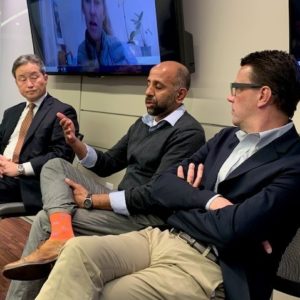This blog post was written by Arizona State University graduate student Kathleen Yetman. In addition to studying Food Policy and Sustainability Leadership at ASU, Kathleen is the Executive Director of the Prescott Farmers Market.
On our second full day in Washington D.C., we heard from food policy experts from all kinds of backgrounds. I was particularly interested to hear the stories of representatives from nonprofit organizations who have been working on food policy. Our nonprofit food policy panel included Brian Ronholm, director of food policy at Consumer Reports, Kumar Chandran, policy director for FoodCorps, and Michael Fernandez, director of the American Association for the Advancement of Science Center for Scientific Evidence in Public Issues. Because I work in the nonprofit sector myself, I was especially curious to learn how nonprofits advocate for better food policies while also maintaining a program-centered mission.
My whole life, my mom has trusted Consumer Reports. If she’s considering making a big purchase, Consumer Reports is where she goes. It was interesting to hear from Brian about his role at Consumer Reports and have a more in-depth understanding of what the organization does. I had not considered their role in food—safety, labeling, etc. For example, I learned that they have food labs where they test the accuracy of nutrition labels. Brian has to stay up-to-date on everything food-related to ensure he is advocating for consumers on Capitol Hill.
I was a FoodCorps service member, then the Arizona FoodCorps Fellow for two years and a site supervisor of a service member for three years, so I’m very familiar with FoodCorps. Since it’s only nine years old, it’s still an evolving and growing organization and I enjoyed hearing from Kumar about some of the recent changes and learning what FoodCorps is currently fighting for on behalf of children in schools.
I was unfamiliar with American Association for the Advancement of Science before this panel and was interested to learn more about the organization. The mission of AAAS is to “advance science, engineering, and innovation throughout the world for the benefit of all people.” For Michael that looks like delivering clear, concise, actionable scientific information to decision-makers to ensure that policies are based on scientific facts. Food policy ranges anywhere from biotechnology to pesticides to nutrition and the environment.
As students visiting the Capitol, just beginning to dip our toes into policy, we were curious how they arrived at their current positions. After all three panelists shared their career paths, someone asked them what specific skills are required in their line of work, and what they would recommend we all hone if we’re thinking about entering policy. Two of their suggestions were: solid researching skills and the ability to seize opportunities. From my understanding, things move fast in policy and to be of any impact, you have to be able to learn about issues quickly and become an expert for a short amount of time. Michael added that it’s important to be able to distinguish between science-based information and science-sounding arguments. It was appropriate advice to “seize opportunities” as we disbursed a few days later amid the COVID-19 crisis. I know one question I continue asking myself is: “How can we use this crisis as an opportunity to change the food system?” I feel that because of our time in Washington D.C., the cohort of the Food Policy and Sustainability Leadership is not only up to the challenge but better equipped to meet it.
